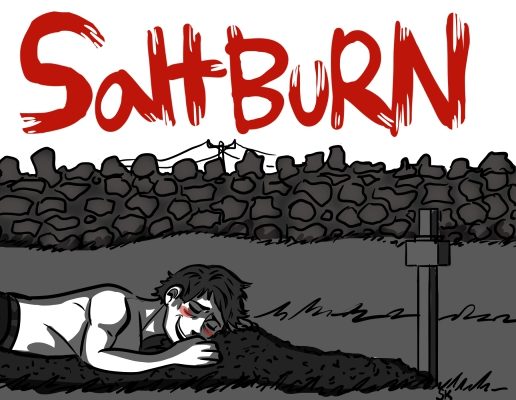Somebody– the internet– told me this was the movie of the year. This was the movie that would change my view of cinema, and my view of life. There would be before Saltburn and after Saltburn. I did not believe this nonsense because Jacob Elordi, who plays Nate Jacobs in Euphoria and the male love interest in the Netflix Original The Kissing Booth, was starring. I figured anything he’s in could not be that serious.
The plot follows two boys attending Oxford. One of them, Felix, is obscenely rich and the other, Oliver, is seemingly poor and comes from a bad home life. Oliver is obsessed with Felix; his wealth, his popularity, his aura, his very fiber of being. After Oliver does Felix a favor, they become best friends and Felix invites him to stay at his family’s estate over the summer. The summer Oliver is at the Saltburn estate changes the trajectory of his life.
I had just read Donna Tartt’s “The Secret History” and was devastated there was not a film adaptation, so I was craving a dark academia movie to take its place. Between the hole in my heart and the pull it had on TikTok, I watched it.
It was unpredictable until about 45 minutes in, and then, everything was obvious. It’s as if nobody has ever seen an unreliable narrator, has never witnessed manipulation, or has never thought about the envy between classes. If it were realistic, if it were based on true events, I would understand how people would think it’s a deranged movie. However, in fiction, this story has been told for centuries and did not break the sound barrier of plot and characterization.
What Saltburn did pull off was its modern Shakespearean quality. While watching, I couldn’t help but see the Iago in one of the characters. It did build phenomenal suspense, the dialogue was disarming, the characters’ reactions were cryptic, and the family dynamic was unconventional.
With thriller movies like this that require a jaw-dropping, morbid moment (usually a death) the motive for psychological and physical harm is always one of three things: money, love, or revenge. In the opening line spoken by Oliver: “I loved him. I loved him, but was I in love with him…?” Where the first half of the movie lacks context or motivation, making for an empty and aimless entrance, the latter half of the movie makes up for it by spilling its guts and revealing full disappointing transparency.
That being said, the sensuality and such saturated infatuation in this movie are what make it the most compelling. The tension and chemistry between the two boys are contrasted with forced and disturbing lust between all of the characters, creating an unnerving, syncopated rhythm of desire in the second half of the film.
One quality that people thought made the movie revolutionary in some way was its jarring and jagged stream of plot, where it focused on details and conversations you didn’t find important or relevant. The substance of the movie is not in its story but in the theatric dialogue. If you’ve watched enough movies, you know that this technique is either a hidden form of foreshadowing or an artsy director sinking their hands into their craft. After the style was repeated a few times a pattern formed, and the rest of the movie unraveled itself into my palm.
I am a bit gullible because when people said that it was a messed up movie over and over, despite my reservations, I believed them. After all, this wasn’t some low-budget, art-house indie film in Norwegian with unaligned English subtitles. This was a box office movie with high production quality. It had to be at least entertaining and visually stimulating. I am a bit pretentious, as told by peers because I said I found the movie underwhelming. The harrowing and popular “grave scene” everyone is shaken by compared to say, some of the scenes you will find in a Norwegian indie film, has left the cinematically desensitized unsatisfied.
If you enjoyed Saltburn, whether or not you agree with the masses, you should watch Triangle of Sadness (2022) for its commentary on class and power, Mother! (2017) for its uneasy suspense and nauseating impact, Shakespeare’s “Othello” from which Saltburn is plagiarized, and Call Me By Your Name (2017) for a story of unhealthy and intimate obsession with another person.


























